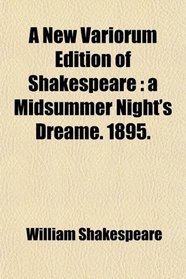Search -
A New Variorum Edition of Shakespeare: a Midsummer Night's Dreame. 1895.
A New Variorum Edition of Shakespeare a Midsummer Night's Dreame 1895
Author:
Purchase of this book includes free trial access to www.million-books.com where you can read more than a million books for free. Excerpt from book: Section 3textit{[Scene //.] textit{Enter Quince the Carpenter, Snug the loyner, Bottome the textit{Weauer, Flute the bellowes-mender, Snout the Tinker, and textit{Starueling the Taylor. text... more »
Author:
Purchase of this book includes free trial access to www.million-books.com where you can read more than a million books for free. Excerpt from book: Section 3textit{[Scene //.] textit{Enter Quince the Carpenter, Snug the loyner, Bottome the textit{Weauer, Flute the bellowes-mender, Snout the Tinker, and textit{Starueling the Taylor. text... more »
ISBN-13: 9781443268233
ISBN-10: 1443268232
Publication Date: 7/6/2009
Pages: 362
Rating: ?
ISBN-10: 1443268232
Publication Date: 7/6/2009
Pages: 362
Rating: ?
0 stars, based on 0 rating




